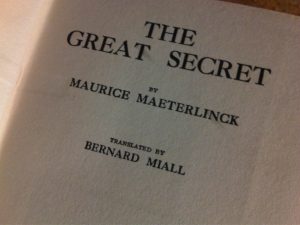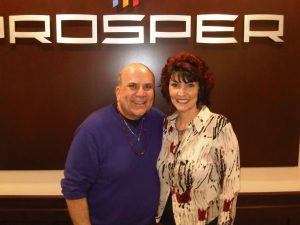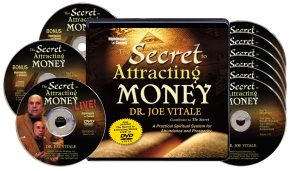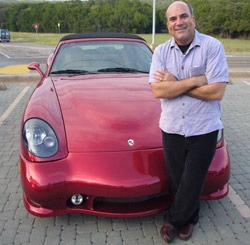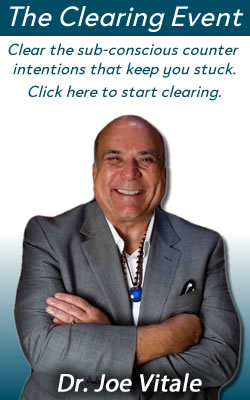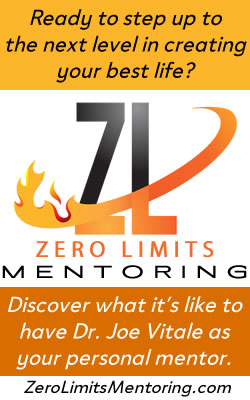Dr. Joe Vitale’s Blog
How Much Is Enough?
For almost a year I held phone masterminds (at no pay to me) with a client. It was a win-win because we supported each other in our quest to be the best – or so I thought.
We “Nevillized” our goals.
We “What If Upped” our intentions.
We “remembered” our successes.
It was thrilling, energizing, exhilarating and wonderful.
But one day I told my client that I received another standing ovation at a recent talk. I was sharing my success with someone who I thought would be inspired by it.
He was silent.
I later learned he felt sick.
When I explored why, he said my success made him ill.
“How much is enough?” he asked.
Think about this…
As long as we talked about an imaginary success, it was fine. But when I reported an actual success, it wasn’t fine.
What’s the difference?
In my experience, it’s often safe to imagine what you want but not safe to actually manifest it. Obviously, there’s a deservingness issue there.
When success is out of arm’s reach, it’s fair to fantasy having it; but grasp it and now it’s real.
Do you accept it or push it away?
It depends on your comfort level with success.
And how much is enough, anyway?
At what point is success “too much”?
Who says a certain level of success is acceptable but more isn’t?
I’ve been saying for decades that you can have virtually whatever you want as long as you don’t need it. If you need something, there’s never enough. If you’re satisfied with this moment and just welcome more, than “enough” isn’t even an issue. You just enjoy life. You accept more because it’s joyful to do so.
And looking at this issue even deeper, doesn’t concern over “too much” reveal a belief in scarcity?
As I explained in my bestselling audio program The Abundance Paradigm, your perception creates your reality. You can look at life and see scarcity or abundance. It depends on your mindset.
Someone who thinks it’s possible to have “too much” success is coming from the scarcity mindset. That’s fine if that’s what you choose. Most of us don’t consciously choose it, though. And once you realize you have a choice, why would you choose scarcity over abundance?
How good can you stand it, anyway?
My client who confronted me about “How much is enough?” when I mentioned my standing ovation, was pulling back from his own potential success. Self-sabotage stopped him. He hit his comfort zone of deservingness.
Decades ago I was taught to be inspired by someone’s success, not jealous of it.
When I was broke and struggling, I learned to see someone driving the nice car or living in the nice house and feel proud of them and inspired by them. It made a huge difference in how I felt about myself, and released energy that I could use to build my own dreams. Today my success is real.
The lesson here is to go for your inspired dreams without reservation or explanation, surround yourself with supportive people who truly want your success as much as you do, and enjoy your adventure forward as every moment is the miracle you seek.
Steve Jobs said —
“Don’t let the noise of others’ opinions drown out your own inner voice. And most important, have the courage to follow your heart and intuition.” – Steve Jobs
There’s no such thing as a ceiling on good, happiness, deservingness or “enough.”
Unless you think there is.
What do you think?
How much do you deserve?
How much is enough for you?
Ao Akua,
PS – I am loving the bubbly music of singer Jem (Jemma Griffiths). Here’s her video for her song It’s Amazing (on her latest CD, Down To Earth), which is a great reminder of all that you can do in your life. Life is amazing. You are amazing. Enjoy.
Attracting Great Movies
Ever since the movie The Secret came out a few years ago, many other people are creating their own films, all with inspiring messages. A new one called “Openings” looks unique. Here’s the trailer for it: (Yes, I’m in it, but don’t let that stop you from watching.) 🙂
Attracting Spirituality
On a recent private call for students in my Miracles Coaching program, someone asked me how I achieved my level of spirituality and what they could do to attract it, too. I reflected on the flattering question and came up with the following:
1. Reading.
I’ve been a bookaholic since I was a teenager. Over the course of 57 years, I’ve read too many books to count. Not all were great. But numerous titles stand out as ones that influenced my spiritual thinking. Emerson and the Transcendentalists movement gave me a deep spiritual insight into the world back in the 1970s. The early Law of Attraction authors flipped me into the stage of empowerment, from William Walker Atkinson to Genevieve Behrend. Neville, of course, awakened me. So did Robert Collier. I’m a fan of everything by Byron Katie and David Hawkins. The Book of est nailed me, as did Why Is This Happening To Me…Again? I’d add listening to self-help audios also made a difference. Decades ago I drove around Houston, often unhappy and looking for work, listening to many programs from Nightingale-Conant. Today I’m published by them. I still read and listen. All of this education informed and inspired me, as well as made me more self-aware. I attribute this on-going study to my success today.
2. Meditation.
I’ve been doing some form of meditation virtually every day since 1980. At one point it was the Dynamic Meditations of Rajneesh; at another it was sitting in silence and focusing on breathing, or repeating a mantra. Later it was “intentional” meditation, where I visualized what I wanted to have or be. These days it’s usually ho’oponopono. Currently I’m experimenting with drumming as a way to clear and center. I think we need to do whatever it takes to connect to the Divine and hear Its whispered inspirations.
3. Coaching.
You might think I’m just trying to sell coaching, but the truth is my life didn’t skyrocket until I got a coach. An outside loving observer can help you see your limiting beliefs. It’s not likely you’ll see them on your own because your beliefs will appear as reality to you. It doesn’t have to be Miracles Coaching, but some form of coaching will help you move forward. There are many programs available. Miracles Coaching is just one.
No doubt there’s more to attracting spirituality, but the above have worked for me.
What has worked for you?
Ao Akua,
PS – I don’t know if this will help you attract wisdom or spirituality, but it’ll certainly move you: My first music CD, called Blue Healer, is ready. It contains five long tracks of what I call blues meets trance music, all designed to stir your energies and awaken your soul. More on it later, but for now go see The Blue Healer.
ULP or How Good Can You Stand It?
Recently I gave a talk where I handed out copies of my books, audios, movies, etc, to each person who asked a question. The crowd loved it, as most crowds do.
It was also an illustration of the power of giving. I told stories of my giving money to causes and people, and even a beloved car to a friend, as examples that giving feels incredible.
But later at my booth a woman came up to me, explaining her dire financial circumstances, and asked for my help in choosing what product of mine to buy. She couldn’t decide.
As I talked with her, I learned she was a medic in the military. She was retiring soon and wanted to open her own business.
I thought about how our troops are helping us and decided I wanted to help back. So I handed her a copy of my bestselling CD and DVD course, The Secret to Attracting Money.
She refused it.
I explained that learning how to receive was an important part of growing.
She cried, still refusing the gift.
I kept talking and she finally accepted it.
But the experience made me wonder why it’s so hard for most of us to receive anything.
Then it was my turn.
Later the same day my friend, Lori Anderson, asked me what I would say if I were given a choice between two gifts.
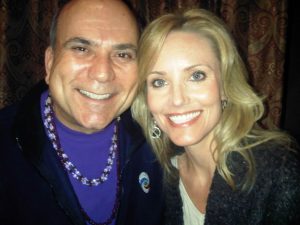
Lori Anderson
I was curious but suddenly vulnerable and protective.
She said, “I know you’re interested in the art work we saw earlier, and I know you’re interested in the handmade drum we saw. Which would you accept as a gift?”
I crossed my arms. I stared at Lori. I felt my heart open but yet my mind wanted to shut it all down. I was being offered a gift. A big one. Both were expensive. Both were treasures to me.
Knowing I had to tell the truth to remain in integrity, I replied, “The drum.”
“That’s what I thought,” she said. “I’ll go buy it for you.”
I stood there in shock. My body shook a little.
Why?
Years ago a coach would ask me and other clients, “How good can you stand it?”
He used the question as a way to probe our sense of deservingness. Most people self-sabotage when things get too good for their comfort zone. They feel they don’t deserve the extra good coming their way.
I’ve seen this behavior repeatedly in people. There have been people I have personally helped (at no charge) who suddenly reach a point where an inner switch goes off and they stop accepting my counsel. It’s been sad to see, as most of them have great potential (which is why I was helping them), but when they hit their ceiling for deservingness, they pulled back.
My friend Gay Hendricks puts it this way:
“What is the ‘Upper Limit Problem’? The ‘ULP’ is the human tendency to put the brakes on our positive energy when we’ve exceeded our unconscious thermostat setting for how good we can feel, how successful we can be, and how much love we can feel. The essential move we all need to master is learning to handle more positive energy, success and love.”
ULP it is.
I saw it that very same day when a friend I was freely helping suddenly insulted me by email, as an unconscious way to get me to halt my giving.
I saw it earlier that day with the medic who initially refused my gift.
And I saw it rear up in myself later still that same day when I was offered a one thousand dollar drum as a gift.
Learning to receive may be as powerful as learning to give. It’s a way to stretch your capacity to love.
Here’s the punchline to round out this story:
Later that very same day (yes, the same day) Mathew Dixon came up to me — not knowing any of the above — and told me of a drummer he met who was beaming with excitement because he had sold a special drum he made and he needed the money.
Of course, the drum he made was the one Lori bought and gifted to me.
Do you see the win-win-win?
The drummer made the sale, Lori got the joy of giving, and I received the beautiful drum.
And I absolutely love my drum.
Learn to give when you’re moved to do so — but also learn to receive when the moment comes.
How good can you stand it, anyway?
Ao Akua,
PS – If you’re ready to receive right now, go collect your free copy of my book, Attract Money Now. If you’re ready to give, tell somebody about it. 🙂
Heads Up: You can be one of the first to hear about my “Healing Music” CD by sending an email to [email protected]
Free Ho'oponopono Training
Whenever I spend time with Dr. Hew Len, I’m reminded of the fundamentals behind Zero Limits and the Hawaiian healing system called ho’oponopono:
There’s nothing to do but clean (i.e., release programs in the mind).
The more you clean, the more you can receive inspiration from the Divine.
You act from Memory or Inspiration, and usually it’s Memory (data).
The only thing to clean is what you feel inside; you’re clearing perception.
The only goal is freedom; to be at Zero.
Knowing the fundamentals is one thing, living them is quite another. This is why we sometimes need books, audios, DVDs, tools, seminars, coaches, and whatever else we can use to remind us that all the work takes place within.
This is why I’m excited to report that today you can have a free online training in ho’oponopono, taught by Dr. Hew Len and myself, by going to-
http://www.zerolimitsonline.com/free-hooponopono-training-lesson-1
The world is made up of “data” and it’s this very data that needs cleaned. The thing is, we perceive all that data as being outside of us, when in reality it’s inside us, so that’s where the cleaning has to take place.
In other words, there’s nothing “out there.” It’s all inside you. That’s where you experience problems and that’s where the cleaning needs done.
Dr. Hew Len often asks, “Have you ever noticed that when you have a problem, you are there?”
Think about that.
“Complete responsibility means accepting it all – even the people who enter your life and their problems, because their problems are your problems. They are in your life, and if you take full responsibility for your life, then you have to take full responsibility for what they are experiencing, too.” – from Zero Limits by Joe Vitale and Dr. Hew Len
But what is the right way to clean?
If cleaning is the number one most important thing to do and is the core of the entire Zero Limits and ho’oponopono process, how do you do it accurately?
Here’s how I do it:
I notice something I consider wrong. This can be triggered by a thought, another person, an event, or anything else. This is the stimulus. Before Zero Limits, noticing a problem was always considered “out there.” After Zero Limits, you realize the problem is inside. It’s actually a problem in perception. Whatever the case, the first step is to notice you don’t feel good. You’re angry, upset, worried, scared, or any other of a wide range of emotions and feelings that could be labeled as unhappy.
I start to clean on the feeling. I don’t clean on the other person, or the thought, or the situation, or anything “out there.” Again, the problem is inside. I’m the one aware of a problem. I’m the one who has to clean it. For me, saying “I love you”, “I’m sorry”, “Please forgive me” and “Thank you” is the way to clean. I say the phrases in any order. I say them non-stop in my mind while feeling the problem as I perceive it. And I say it to the Divine.
I sometimes use other cleaning methods. For example, the last time I saw Dr. Hew Len, he told me my own business card (the one with my red Panoz car on it called Francine) is a cleaning tool. He said, “In your mind imagine slicing the problem up with the edge of the card.”
I let go of need, addiction or attachment and wait to be prompted to take inspired action. Dr. Hew Len once told me that he cleans on a decision three times. If the answer is the same after those cleanings, he takes action on it. This means if I get an impulse to do something to resolve the perceived problem, I might clean on it three times before I actually take any action. This is a way to insure the action is coming from inspiration and not memory.
Repeat as needed.
Everyone wants a short-cut to cleaning and reaching Zero. I do, too.
But it’s that very impatience that needs cleaned. Wanting something right now is Memory playing out, urging us to get instant gratification. It’s data. The Divine has no sense of time and no urgency. Wanting things to unfold faster than they unfold is a wonderful opportunity to clean.
I keep cleaning because it makes me feel lighter, happier and healthier; it is a fast-track way for me to remove the data in my being so I can get closer to the Divine; and because it’s easy, effortless, and free.
Until the Divine gives me another way to clean, I’ll keep on cleaning.
Ao Akua,
Joe
PS – Remember, today’s free training in ho’oponopono, taught by me and Dr. Hew Len, is at
http://www.zerolimitsonline.com/free-hooponopono-training-lesson-1




